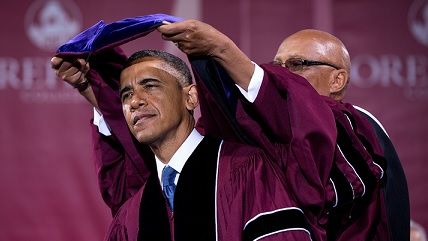Obama's Anti-Profit Crusade Targets Colleges
The administration imposed a death penalty on ITT technical colleges, which had not been convicted of any wrongdoing.

It isn't every day that you see a moderately liberal institution like the Washington Post accuse a Democratic president of waging an "ideological crusade." But the newspaper did just that last Sunday, blasting the Obama administration for its campaign against for-profit colleges.
The Post pointed out that the Education Department has just imposed the death penalty on ITT Technical Institutes, despite the fact that the school chain has not been accused—let alone convicted—of any wrongdoing. The department carried out the extrajudicial killing by bureaucratic fiat, imposing stringent financial requirements and declining federal aid to new students.
The result: 40,000 students left hanging, 8,000 people suddenly without a job, and a huge taxpayer liability for federal student loans.
A similar story played out two years ago, when federal agencies pulled financial aid from Corinthian College and ground it down with an endless series of administrative orders. No charges ever were brought, but Corinthian, too, was driven out of business.
And this summer the Education Department proposed decertifying the principal accreditor of for-profit colleges and vocational schools—a huge threat to more than 200 colleges, 800,000 students, and $5 billion in student loans. Taxpayers could be on the hook for some of that money: When Corinthian shut down, Washington ended up forgiving $171 million worth of student loans.
There's no doubt that some for-profit colleges exploit naïve, sometimes poor students who rack up lots of debt with the false promise of a clear flight path to a solid career. But then, why should they be any different? You can say exactly the same about many public and nonprofit private universities—some of whose graduation rates are downright atrocious.
Here in Virginia, Norfolk State University's is a mere 34 percent. What's more, scarcely more than half of those students who do graduate end up making more than a high-school graduate does, according to the U.S. Department of Education's college scorecard. That's slightly worse than the record for the now-shuttered ITT Technical Institute in Norfolk.
Indeed, according to a recent report from Third Way, "Too Many Public Colleges Are Dropout Factories," the typical four-year public college has a graduation rate of lower than 50 percent; 36 percent of students make less than $25,000 six years after enrollment; and less than one-sixth of schools with higher-than-average Pell Grant rates have six-year graduation rates over 50 percent.
Figures like those might come as a surprise, but it's no surprise that colleges and universities have been hiking tuition at incredible rates despite such poor performance. Since 1972, the inflation-adjusted cost of a nonprofit private university has shot up from $1,832 to $31,231.
The cost of a public university has shot up from less than $500 to $9,139. Those represent 16-fold and 17-fold increases, respectively. President Obama has blasted for-profit colleges for "making out like a bandit," but they seem to have a lot of company.
So pointing the finger at for-profit universities may be a convenient way of changing the topic. Barmak Nassirian, who runs federal relations and policy analysis for the American Association of State Colleges and Universities, calls the for-profit college sector "a slow-motion train wreck. … The government hasn't really done anything. I'd love to have cops on the beat who can prevent crime, not chase after perpetrators after the mayhem."
Translation: Colleges supported by one arm of the government would like another arm of the government to to squeeze out competition from the non-governmental sector. Got it.
The Obama administration's crusade has enjoyed plenty of support, but not all Democrats find for-profit education loathsome. Certainly not Bill Clinton, for instance.
From 2010 to 2015, the former president raked in $17.6 million for serving as "honorary chancellor" at Laureate University. Just a few months before he landed that gig, the State Department invited Laureate's founder to a private dinner at the urging of the department's then-Secretary Hillary Clinton, who touted Laureate as "the fastest-growing college network in the world."
Now, as Politico reported this summer, "as the Obama administration cracks down on for-profit colleges, three former officials working on behalf of an investment firm run by President Barack Obama's best friend have staged a behind-the-scenes campaign to get the Education Department to green-light a purchase of the biggest for-profit of them all—the University of Phoenix." Among the officials: Former Deputy Education Secretary Tony Miller, who played an important role in the crackdown on for-profit colleges.
If the investors get the Education Department's permission, they also will get a bargain. The University of Phoenix stock price stood at $85.64 per share when Obama took office. Today, thanks in no small part to the administration's policies, it's below $9.
Miller could gain handsomely from the deal—especially now that some other for-profit colleges have been taken off the board. The only thing better than an ideological crusade, apparently, is one with a big payout at the end.
This column originally appeared in the Richmond Times-Dispatch.


Show Comments (115)